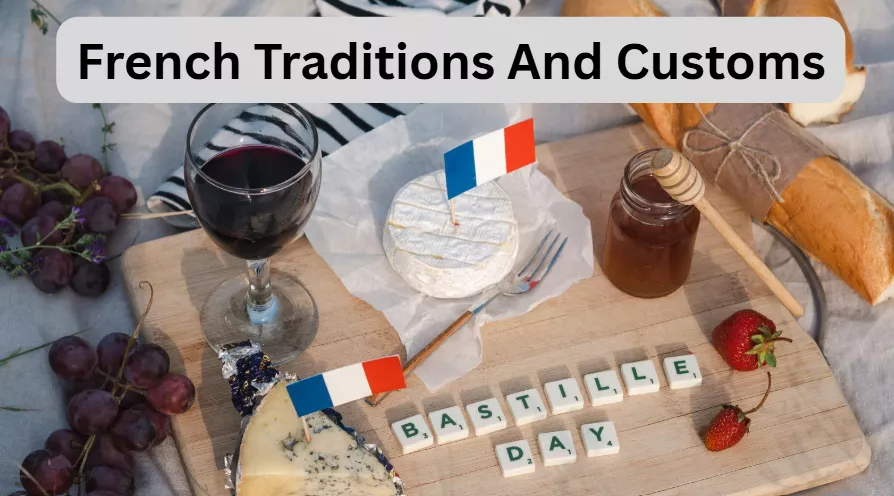French Traditions and Customs You Should Know
Have you ever wondered what makes France so enchanting beyond its iconic Eiffel Tower? French traditions, deeply influenced by the legacy of the French Revolution, shape the nation’s vibrant culture in ways that continue to surprise even frequent visitors. From culinary rituals to seasonal festivals, these customs reflect both rich history and modern life. In this article, we’ll explore fascinating practices that define everyday experiences in France and uncover the true soul of this captivating nation.
French Language In Louisiana: History, Survival, And The Modern Revival You See Today
Notre Dame Paris Wedding: What Americans Need To Understand Before Planning Anything
The Importance Of French Traditions In Modern Society
French traditions are deeply intertwined with national identity, influencing how people celebrate, eat, and interact daily. While globalization has introduced new trends, many customs remain firmly rooted, offering a sense of continuity and belonging. From family gatherings to public celebrations, these traditions continue to thrive in modern France.
The Role Of Family In French Traditions
Family is at the heart of most French customs. French households often prioritize meals together, especially on Sundays. Family gatherings are viewed as sacred, and events such as
s, weddings, and Christmas are celebrated with elaborate meals and strong generational bonds.
Sunday Lunch: A Cherished Family Ritual
One of the most enduring traditions is the Sunday lunch, where extended families gather for a multi-course meal that can last for hours. This gathering often includes classic dishes like roast chicken, fresh baguettes, and cheese platters, reflecting the country’s deep culinary pride.
Celebrating Milestones With Elegance
Baptisms, communions, and weddings are not just family events but cultural milestones. These occasions typically feature elegant attire, gourmet dining, and time-honored customs, blending old traditions with modern flair.
Culinary Customs That Define French Life
Food in France is more than sustenance; it’s an art form and social glue. French culinary traditions shape daily routines, festivals, and even business culture.
The Ritual Of Daily Bread
The baguette is an iconic part of French life, and buying fresh bread daily is almost a national law. Visiting a local boulangerie in the morning is a ritual for millions, symbolizing freshness and quality.
Cheese And Wine: More Than Just Food
Cheese and wine are inseparable from French identity. With over 400 varieties of cheese and globally renowned wine regions, these staples often appear at family tables, formal dinners, and celebrations.
Mealtime Etiquette: A Cultural Experience
Dining etiquette is another fascinating aspect. For instance, keeping both hands on the table and avoiding placing elbows is standard practice. Meals are seen as a time for conversation and savoring, not rushing.
Iconic French Festivals And National Celebrations
France hosts a rich calendar of festivals and national events that highlight its heritage, creativity, and pride.
Bastille Day: A National Symbol Of Freedom
Celebrated on July 14, Bastille Day marks the start of the French Revolution. It features military parades, fireworks, and communal gatherings, embodying national unity and freedom.
Epiphany And The Galette Des Rois
Epiphany, celebrated in early January, brings the tradition of the galette des rois, a puff pastry cake with a hidden figurine. Whoever finds the figurine becomes the king or queen of the day, wearing a golden paper crown.
Fête De La Musique: A Celebration Of Sound
Every June 21, France turns into a stage for musicians of all genres. This event transforms streets, parks, and squares into concert venues, encouraging participation and community spirit.
Seasonal Traditions Across France
Different regions in France uphold unique seasonal traditions, adding to the cultural diversity within the country.
Christmas Markets In Alsace
The Christmas markets in Alsace are among the most charming in Europe. They feature handcrafted ornaments, mulled wine, and traditional delicacies, creating a fairy-tale atmosphere during the festive season.
Summer Festivals In Provence
Provence shines in summer with festivals dedicated to lavender, music, and local crafts. These gatherings blend tradition with scenic beauty, attracting locals and tourists alike.
Weddings And Romantic Customs In France
French weddings often reflect a balance between tradition and elegance. While modern influences shape today’s ceremonies, certain rituals remain constant.
The Vin D’Honneur Tradition
After the wedding ceremony, guests are invited to a vin d’honneur—a wine reception offering drinks and appetizers. This allows couples to greet all guests, including those not attending the full dinner.
La Pièce Montée: The Iconic Wedding Dessert
The pièce montée, a towering croquembouche made of cream-filled choux pastry, is a must-have at French weddings, symbolizing celebration and craftsmanship.
Fashion And Cultural Etiquette
French traditions extend into fashion and social behavior, reinforcing the country’s reputation for elegance and sophistication.
Dressing Well: A Mark Of Respect
In France, dressing appropriately for occasions—even casual ones—is seen as a sign of respect for oneself and others. Minimalism and elegance often define French style.
Greeting Customs: The Art Of La Bise
La bise, the traditional cheek kiss greeting, is an integral part of French social etiquette. The number of kisses varies by region, but the gesture remains a warm symbol of friendship and familiarity.
Religious Traditions And Their Modern Significance
Although France is a secular country, religious traditions still shape cultural practices, especially during major holidays.
Easter And Chocolate Bells
Unlike the Easter Bunny, France has the tradition of chocolate bells, symbolizing church bells returning from Rome. Families exchange these treats during Easter celebrations.
Christmas Eve Réveillon
The Réveillon feast on Christmas Eve is a cherished custom, featuring luxurious dishes like foie gras, oysters, and bûche de Noël (Yule log cake), followed by midnight mass for those observing religious practices.
Sports And National Pride
Sports are woven into French culture, with traditions linked to community and national pride.
The Tour De France
The Tour de France is more than a cycling race—it’s a cultural event celebrated nationwide. Communities along the route gather to cheer, making it a festive occasion for locals and visitors.
Football Fever
Football holds a special place in French hearts, especially during international tournaments. Victories spark street celebrations, uniting people across the country.
French Traditions In Rural Life
In rural France, traditions often reflect agricultural roots, emphasizing festivals tied to seasonal harvests and local craftsmanship.
Harvest Festivals
Grape harvest celebrations in wine regions include communal feasts, music, and dancing, honoring the connection between land and livelihood.
Artisan Markets
Weekly markets remain a rural tradition, showcasing regional produce, cheeses, and crafts. These markets are as much about socializing as they are about shopping.
FAQ
What Is The Most Famous French Tradition?
Bastille Day, celebrated on July 14, is the most iconic French tradition, marking the French Revolution. It includes fireworks, parades, and community gatherings across the country.
How Do French People Celebrate Christmas?
Christmas in France involves festive markets, family dinners on Christmas Eve, and attending midnight mass. The meal often includes delicacies like oysters, foie gras, and bûche de Noël for dessert.
Why Is Bastille Day Significant In France?
Bastille Day symbolizes freedom and the beginning of modern democracy in France. It commemorates the storming of the Bastille prison during the French Revolution in 1789.
What Are Common French Wedding Traditions?
Common traditions include the vin d’honneur reception, la pièce montée dessert, and formal attire. Some couples also follow customs like the bridal procession and the mairie ceremony for legal marriage.
Do French People Still Do La Bise?
Yes, la bise remains a popular greeting, though the number of kisses varies by region. It’s commonly practiced among friends and family rather than in formal or business settings.
What Is The Galette Des Rois Tradition?
Galette des Rois is a puff pastry cake eaten during Epiphany in January. It contains a hidden figurine, and the person who finds it becomes the “king” or “queen” for the day.
How Do French People Celebrate Easter?
Instead of the Easter Bunny, France has the tradition of chocolate bells. Families exchange these treats, symbolizing church bells returning from Rome, and enjoy festive meals together.
What Role Does Food Play In French Traditions?
Food is central to French traditions, symbolizing hospitality and cultural pride. Meals are elaborate, emphasizing fresh ingredients, regional recipes, and shared experiences among family and friends.
Is Wine A Part Of All French Celebrations?
Wine plays a significant role in French celebrations, from weddings to national holidays. France’s diverse wine culture reflects regional pride and is often paired with traditional dishes.
Why Do French People Buy Fresh Bread Daily?
Buying fresh bread daily is a cultural norm rooted in valuing freshness and quality. The baguette, a national symbol, is typically purchased each morning from local bakeries.
What Is The Significance Of Sunday Lunch In France?
Sunday lunch is a cherished family tradition in France. It often lasts for hours, featuring multiple courses and lively conversation. It’s a time for bonding and maintaining close family ties.
Do All French Regions Have The Same Traditions?
No, traditions vary across regions. For example, Alsace has unique Christmas markets, while Provence celebrates lavender festivals in summer. Regional differences make French culture rich and diverse.
Why Is Fashion Considered Important In French Culture?
Fashion in France reflects elegance and respect for oneself and others. Dressing well is seen as a cultural value, whether for work, social gatherings, or casual outings.
How Do The French Celebrate New Year’s Eve?
New Year’s Eve, known as “La Saint-Sylvestre,” includes a festive meal with champagne and foie gras. Many people celebrate at home with family or friends, followed by fireworks at midnight.
What Is La Chandeleur And Why Is It Celebrated?
La Chandeleur, or Candlemas, is celebrated on February 2 by making crêpes. It’s both a religious and cultural tradition, symbolizing prosperity and the return of longer days.
Are There French Traditions Related To Wine Harvest?
Yes, grape harvest festivals are common in wine regions. They feature grape-picking activities, parades, music, and communal meals, honoring the connection between land and local heritage.
How Do The French Greet Strangers?
When meeting strangers, the French typically use a handshake. In informal settings, la bise (cheek kisses) is reserved for acquaintances, friends, and family.
What Are Traditional French Easter Foods?
Traditional Easter dishes include lamb, chocolate bells, and seasonal vegetables. These meals are often shared during family gatherings, emphasizing fresh and local ingredients.
Why Is Cheese So Important In French Cuisine?
Cheese is a cornerstone of French culinary heritage. With hundreds of varieties, it reflects regional identity and is typically enjoyed during family meals or as part of a cheese course.
Do The French Celebrate Halloween?
Halloween is not a traditional French holiday, but it has gained popularity in recent years, especially among young people. Celebrations usually involve costumes, parties, and themed desserts.
What Is The Meaning Behind La Bise?
La bise, or cheek kissing, symbolizes warmth and friendliness. It’s a social gesture deeply rooted in French etiquette, though its frequency depends on personal comfort and regional norms.
Are There Any French Traditions For Birthdays?
Birthdays in France are usually celebrated with family and close friends. Cakes, gifts, and toasts are common, but elaborate parties are less traditional compared to some cultures.
How Do The French Celebrate Valentine’s Day?
Valentine’s Day in France focuses on romantic dinners, flowers, and chocolates. It’s considered an intimate occasion for couples rather than a family-oriented holiday.
What Are Common French Wedding Dresses Like?
French wedding dresses typically emphasize elegance and simplicity. Lace, silk, and intricate details are popular choices, reflecting the country’s renowned fashion sense.
What Is The Significance Of The Bûche De Noël?
The Bûche de Noël, or Yule log cake, is a Christmas dessert symbolizing the warmth of the hearth. Traditionally made of sponge cake and buttercream, it’s a festive centerpiece.
How Do The French Celebrate Labor Day?
On May 1, Labor Day in France is marked by giving lily-of-the-valley flowers to loved ones. It’s a national holiday celebrating workers’ rights and spring renewal.
Are There Traditional French Dances Still Practiced Today?
Yes, traditional dances like the Breton fest-noz or Provençal farandole are still performed at local festivals, preserving regional heritage and music.
What Is The Role Of Markets In French Culture?
Markets are a cornerstone of French life, offering fresh produce, cheeses, and local specialties. They serve as social hubs where neighbors connect and support local farmers.
Why Is Lavender Important In Provence Traditions?
Lavender symbolizes Provence’s identity. Summer lavender festivals feature parades, music, and artisanal products, celebrating the plant’s cultural and economic significance.
What Are Some French Newborn Traditions?
Baptism remains an important tradition for many families. Gifts like silver spoons or engraved jewelry are common, and family gatherings often follow the ceremony.
How Do French People Celebrate Music Day?
On June 21, the Fête de la Musique transforms streets into open-air concert venues. Amateur and professional musicians perform for free, celebrating music and community spirit.
Are There Traditional French Drinks Besides Wine?
Yes, drinks like pastis, a popular anise-flavored aperitif, and cider from Normandy are part of French traditions. These beverages often accompany regional dishes and social gatherings.
How Do The French Celebrate Epiphany?
Epiphany is celebrated with the galette des rois, which hides a small figurine inside. The person who finds it wears a paper crown and becomes “king” or “queen” for the day.
What Are Popular French Engagement Traditions?
Engagements in France often involve a family meal where the couple announces their plans. Some families exchange symbolic gifts, like jewelry, during this occasion.
How Is Mother’s Day Celebrated In France?
Mother’s Day, or Fête des Mères, is celebrated with flowers, cards, and family meals. It usually takes place at the end of May or early June, depending on the calendar.
What Is Special About French Christmas Markets?
French Christmas markets, especially in Alsace, feature wooden chalets selling crafts, ornaments, and seasonal treats like mulled wine and gingerbread, creating a magical holiday atmosphere.
Why Is The Tour De France Important?
The Tour de France is not only a major sporting event but also a cultural celebration. It showcases the country’s landscapes and unites communities in support of the cyclists.
Do The French Have Superstitious Traditions?
Yes, common superstitions include avoiding placing bread upside down on the table, which is considered bad luck. These small rituals still hold significance in daily life.
Are There Traditional French Children’s Games?
Yes, games like “cache-cache” (hide-and-seek) and “marelle” (hopscotch) remain popular among children, often played in schoolyards and during family gatherings.
How Do The French Honor Their Dead?
On November 1, All Saints’ Day, families visit cemeteries to place chrysanthemums on graves, honoring loved ones with flowers and remembrance.
Are French Traditions Changing Today?
Yes, modern lifestyles and globalization have influenced traditions, but many customs remain strong, especially during family gatherings, holidays, and regional festivals that preserve cultural identity.
Conclusion
French traditions and customs are more than rituals—they’re the threads that weave together history, family, and identity. From elegant weddings to lively festivals and from culinary artistry to regional celebrations, these customs showcase the richness of French culture. Whether you’re planning to visit or simply curious, embracing these traditions offers a deeper appreciation of what makes France truly unique.







